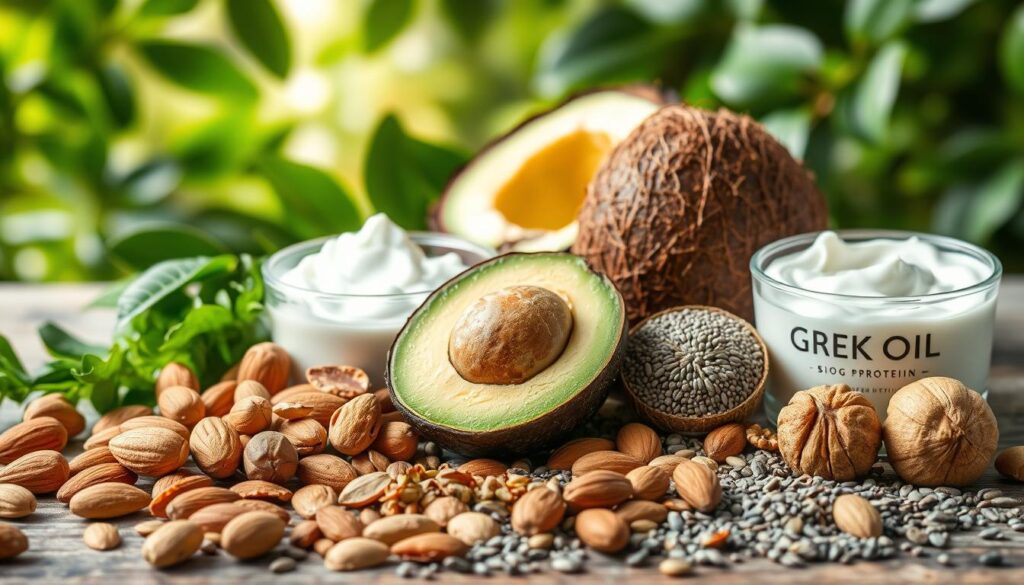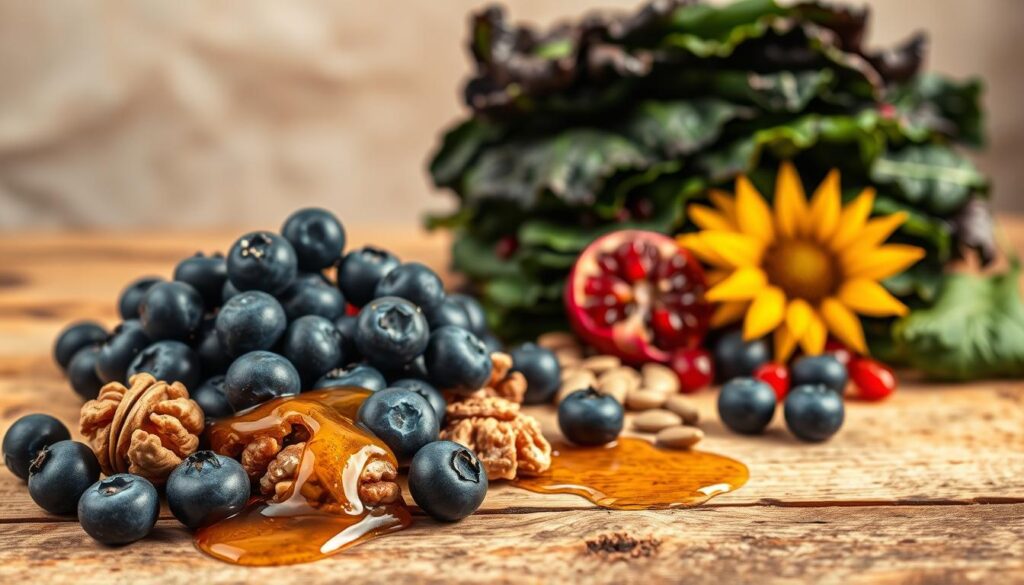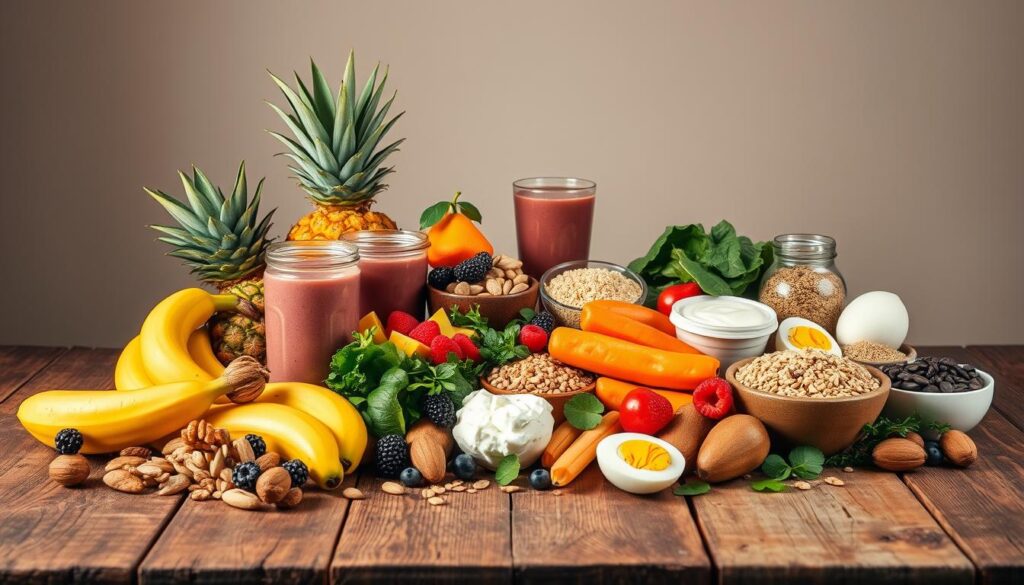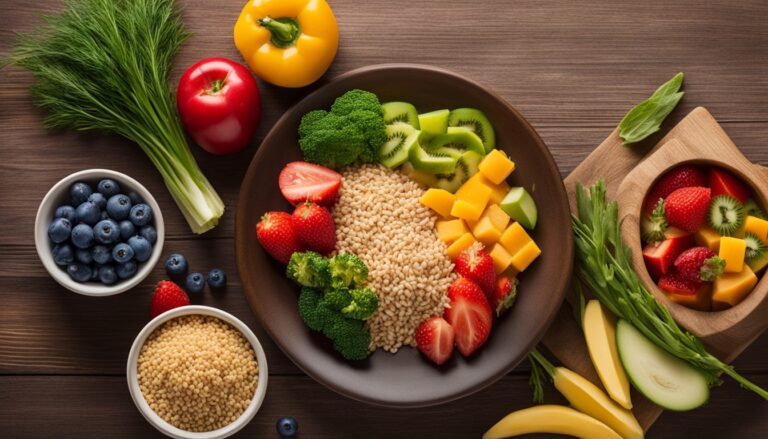What if the key to unlocking optimal post-workout recovery lies in the foods we eat? Eating the right foods after a workout can help with recovery and support muscle growth.
The right nutrition can help replenish energy stores, repair muscle damage, and support muscle growth. Foods high in protein, such as eggs and chicken can help repair muscle damage, while complex carbohydrates, such as whole grains and starchy vegetables, can help replenish energy stores.
Understanding the importance of post-workout nutrition is key for health conscious individuals. The right foods can provide the necessary nutrients for muscle recovery. By incorporating foods rich in protein complex carbohydrates, and healthy fats into their diet, individuals can support their overall health and fitness goals.
Key Takeaways
- Eating the right foods after a workout can help with recovery and support muscle growth
- Foods high in protein, such as eggs and chicken, can help repair muscle damage
- Complex carbohydrates, such as whole grains and starchy vegetables, can help replenish energy stores
- Hydration is essential for post-workout recovery, with plain water being a preferable choice over sports drinks
- A balanced diet that includes a variety of nutrient-dense foods can support overall health and fitness goals
- Post-workout nutrition should be tailored to individual needs, taking into account factors such as workout intensity and duration
- Incorporating foods rich in omega-3 fatty acids, such as salmon, can help reduce muscle soreness and inflammation
Understanding Post Workout Recovery Nutrition
Recovery nutrition is key after a workout. It helps your body heal. The International Society of Sports Nutrition ISSN says eating 20 to 40 grams of protein every 3 to 4 hours helps a lot.
When you eat is just as important. Waiting too long to eat carbs can slow down muscle recovery. Eating a mix of carbs and protein within 30-60 minutes after working out helps a lot.
The Science Behind Recovery Nutrition
The science of recovery nutrition is complex. It involves carbs, protein, and fat. The ISSN suggests eating 3.6 to 5.5 grams of carbs per pound of body weight daily to fill up glycogen stores.
Why Timing Matters
Timing is everything in recovery nutrition. The National Athletic Trainers’ Association NATA says drink 500 to 600 ml of water 2 to 3 hours before and 200 to 300 ml within 10 to 20 minutes after working out. Waiting too long to eat can slow down recovery.
The Mind Body Connection in Recovery
The mind-body connection is important for recovery. Stress, sleep, and other factors can affect how well you recover. A balanced lifestyle, including a healthy diet and enough sleep, supports this connection.
Understanding recovery nutrition, timing, and the mind-body connection helps you recover better. It supports your health and well-being.
| Nutrient | Recommended Intake |
|---|---|
| Protein | 20-40 grams every 3-4 hours |
| Carbohydrates | 3.6-5.5 grams per pound of body weight daily |
| Water | 500-600 ml 2-3 hours before exercise, 200-300 ml within 10-20 minutes after exercise |
Protein Rich Foods for Muscle Recovery
When it comes to muscle recovery, the right foods are key. Protein-rich foods are essential for fixing and growing muscle after exercise. Experts say you need 1.4–2 grams of protein for every kilogram of your body weight each day.
Good protein sources for muscle recovery include lean meats like chicken and turkey. Fish like salmon and tuna are also great. Eggs, Greek yogurt, and cottage cheese are full of protein. Beans, lentils, and tofu are good plant-based options too.
Eating a meal with protein, carbs, and fats helps with muscle recovery and health. Make sure to eat a meal with enough protein within an hour after working out for best results.

| Food | Protein Content per 3-ounce serving |
|---|---|
| Chicken Breast | 26.7g |
| Salmon | 17g |
| Turkey Breast | 26g |
| Tuna | 20g |
Complex Carbohydrates That Support Recovery
Complex carbohydrates are key for refilling energy and helping muscles after exercise. They are full of fiber, vitamins, and minerals. This makes them vital for a recovery diet. Foods like whole grains, starchy veggies, and natural sugars are good examples.
Whole Grain Options
Whole grains like brown rice, quinoa, and whole wheat are packed with complex carbs and fiber. They give long-lasting energy and aid muscle function. Here are some whole grain choices:
- Brown rice
- Quinoa
- Whole wheat bread
- Oats
Starchy Vegetables
Vegetables like sweet potatoes, corn, and peas are also full of complex carbs and fiber. They offer important vitamins and minerals like potassium and vitamin A. Here are some starchy veggies:
- Sweet potatoes
- Corn
- Peas
- Pumpkin
Natural Sugar Sources
Fruits and honey are natural sugar sources rich in complex carbs and fiber. They also give essential vitamins and minerals like vitamin C and potassium. Here are some natural sugar sources:
- Fruits such as bananas and apples
- Honey
- Maple syrup
Adding complex carbs to your diet helps refill energy, supports muscles, and boosts health and well-being.
| Food | Complex Carbohydrates g | Fiber g |
|---|---|---|
| Brown rice 1 cup | 45 | 3.5 |
| Quinoa 1 cup | 40 | 5 |
| Sweet potatoes 1 medium | 37 | 4 |
Essential Fats for Post Workout Health
Essential fats are key for post-workout health. They help with hormone production, brain function, and overall well-being. Foods like salmon and walnuts, rich in omega-3 fatty acids, reduce inflammation and support heart health.
Adding small portions of healthy fats after exercise can help with recovery. This is because they have anti-inflammatory benefits.
Here are some examples of essential fats and their benefits:
- Omega-3 fatty acids: reduce inflammation and support heart health
- Monounsaturated fats: support heart health and provide sustained energy
- Polyunsaturated fats: support heart health and provide essential fatty acids
It’s best to keep fat intake small in post-workout meals. Focus on monounsaturated and polyunsaturated fats. Eating more healthy fats can aid recovery, but don’t let them take over your meal. 
| Fat Type | Benefits |
|---|---|
| Omega-3 fatty acids | Reduce inflammation, support heart health |
| Monounsaturated fats | Support heart health, provide sustained energy |
| Polyunsaturated fats | Support heart health, provide essential fatty acids |
Adding essential fats to post-workout meals can greatly improve recovery and health. By choosing the right fats and eating them in moderation, you can support your health and reach your fitness goals.
What Foods Are Best for Recovery A Comprehensive Guide
Choosing the right foods after working out is key. Recovery foods help refill energy, fix muscles, and boost health. We’ll look at the top recovery foods, including quick-acting and slow-release options, and combination foods for the best results.
Quick Acting Recovery Foods
Quick-acting foods give you energy fast. Think bananas, berries, and other fruits. They’re full of carbs and sugars, helping to refill your energy and support muscles.
Slow-Release Energy Options
Slow-release foods give energy for longer. Think whole grain bread, avocado, and foods with complex carbs and healthy fats. They help muscles and keep you full and satisfied.
Combination Foods for Optimal Results
Combination foods mix protein, carbs, and fats. Try Greek yogurt with berries and honey, or a smoothie with protein, banana, and almond milk. They aid in muscle recovery, energy replenishment, and overall health.
Adding these recovery foods to your diet supports health and fitness goals. Aim for a mix of quick-acting and slow release foods. Also, choose combination foods for the best nutrition for recovery.
Hydration-Rich Foods for Enhanced Recovery
Drinking enough water is key after working out. Eating foods rich in water and electrolytes helps a lot. These foods replace what’s lost during exercise.
Watermelon and cantaloupe are great for staying hydrated because they’re full of water. Coconut water and sports drinks are also good for getting back electrolytes. Adding these to your post-workout meal helps your body recover.
Water-Dense Fruits
- Watermelon: rich in water and electrolytes
- Cantaloupe: high in water content and a good source of potassium
Electrolyte Rich Options
- Coconut water: a natural source of electrolytes
- Sports drinks: designed to replenish electrolytes lost during intense exercise

Eating foods rich in water and electrolytes helps your body recover after exercise. By choosing the right foods you can improve your recovery and performance.
| Food | Water Content | Electrolyte Content |
|---|---|---|
| Watermelon | High | Potassium, magnesium |
| Cantaloupe | High | Potassium |
| Coconut water | High | Potassium sodium magnesium |
Anti Inflammatory Foods That Speed Recovery
Incorporating anti-inflammatory foods into your diet can greatly aid in recovery from injury or intense physical activity. These foods help lessen muscle soreness and boost overall health. Examples include berries, fatty fish, broccoli, avocados, mushrooms, peppers, and grapes.
A balanced diet with these foods can help reduce inflammation during recovery. Adding turmeric supplements can also have anti-inflammatory effects, speeding up recovery. Omega-3 fatty acids, found in flaxseed, chia seeds, walnuts, and fatty fish, also reduce inflammation.
Some key anti-inflammatory foods for recovery are:
- Leafy greens like spinach and kale
- Fatty fish like salmon and mackerel
- Nuts and seeds like walnuts and chia seeds
- Fruits like berries and avocados
Adding these foods to your diet can help reduce inflammation and aid in recovery. It’s important to eat a variety of whole foods to get the nutrients you need for good health.
| Foods | Anti-Inflammatory Properties |
|---|---|
| Berries | High in antioxidants |
| Fatty Fish | Rich in omega-3 fatty acids |
| Broccoli | Contains sulforaphane |
Foods That Support Mental Recovery and Mood
Nutrition is key for mental health. Eating foods that boost serotonin, like dark chocolate and fermented foods, can lift your mood. Foods high in complex carbs and lean proteins also help your brain.
Fatty fish, such as salmon and albacore tuna, are good for your brain. They have omega-3 fatty acids, which fight depression. A small salmon piece has enough omega-3 to meet daily needs.

Leafy greens and fatty fish are also good for your brain. They have B vitamins. Fruits like bananas and berries help too, thanks to magnesium and vitamin B6. Adding these foods to your diet can help your mood and mental health.
Timing Your Post Workout Meals
Timing is key when it comes to post-workout meals. You want to eat a meal with carbs and protein soon after exercising. This is called the golden window, which is 30-60 minutes after your workout.
Eating a meal with carbs and protein in this time helps your muscles recover and grow. Your post-workout meal should have 10-25 grams of protein. This helps repair and grow your muscles. Also, carbs help keep your blood sugar stable and refill your glycogen stores.
Meal Spacing Guidelines
To get the most from your post-workout nutrition, follow meal spacing guidelines. Eat a balanced meal or snack every 3-4 hours. This keeps your energy up and supports recovery.
Here are some key considerations for meal spacing:
- Consume a balanced meal within 30-60 minutes after a workout
- Include 10-25 grams of high-quality protein in your post-workout meal
- Space out meals and snacks every 3-4 hours to maintain energy levels
By following these guidelines and considering your individual needs, you can optimize your post-workout nutrition. Remember to stay hydrated and adjust your meal spacing and nutrition plan as needed.
| Timing | Meal/Snack | Protein Content |
|---|---|---|
| Within 30-60 minutes after workout | Balanced meal with carbohydrates and protein | 10-25 grams |
| Every 3-4 hours | Meal or snack with balanced macronutrients | Varies depending on individual needs |
Recovery Foods for Different Types of Workouts
When it comes to recovery foods, different workout types need special nutrition for the best recovery. For endurance sports like distance running or cycling, foods rich in complex carbs are key. These include whole grains and starchy veggies to refill energy.
On the other hand, strength training, like weightlifting, needs protein-rich foods. These are lean meats, fish, and eggs to help muscles repair and grow. For high-intensity interval training HIIT, a mix of carbs and protein is best for recovery.

- Endurance sports: whole grains, starchy vegetables, fruits
- Strength training: lean meats, fish, eggs, dairy products
- HIIT workouts: balanced mix of carbohydrates and protein
Choosing the right recovery foods for your workout type helps a lot. It supports better recovery, less muscle soreness, and better performance.
| Workout Type | Recovery Foods |
|---|---|
| Endurance sports | Whole grains, starchy vegetables, fruits |
| Strength training | Lean meats, fish, eggs, dairy products |
| HIIT workouts | Balanced mix of carbohydrates and protein |
Common Recovery Nutrition Mistakes to Avoid
Recovery nutrition is key for athletes. Mistakes in this area can slow progress and increase injury risk. A big mistake is timing errors, where athletes don’t eat the right foods at the right time. This can cause energy loss, muscle damage, and poor performance.
Another common error is portion control issues. Athletes might eat too much or too little of certain nutrients. Eating too much protein can harm the kidneys, while not enough can slow muscle growth. Nutrient balance mistakes happen when athletes don’t get the right mix of carbs, protein, and fats.
Avoiding Common Mistakes
- Eat a balanced meal with carbs, protein, and healthy fats 2-3 hours before workouts
- Try to get 1 gram of protein for every pound of body weight for best recovery
- Drink at least 8-10 cups of water a day to stay hydrated
By avoiding these recovery nutrition mistakes, athletes can improve their performance and health. It’s important to stay hydrated, eat a balanced diet, and time meals right. This will help you get the most from your training.
Conclusion
Proper recovery nutrition is key for muscle repair and reducing inflammation after a tough workout. It helps improve overall well-being. By eating the right mix of protein-rich, complex carbohydrate, and anti-inflammatory foods, you can boost your body’s recovery. This sets you up for better athletic performance and long-term health.
Adding foods like antioxidant-rich berries and ginger to your diet is important. So are omega-3-packed walnuts and turmeric. These foods help with different parts of recovery. Making recovery nutrition a focus can reduce muscle soreness and fatigue. It also supports your overall health and well-being.





